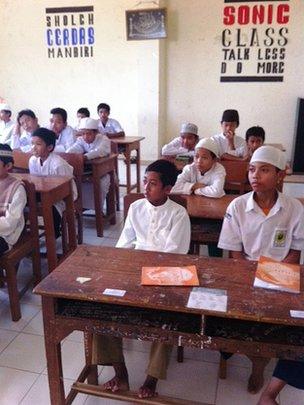Is Indonesia Ngruki Islamic school teaching terrorism?
- Published

As recent terror arrests in Indonesia refocus attention on the country's fight against extremism, the BBC's Karishma Vaswani looks at the Islamic school said to have nurtured many of the militants.
Amrozi, Mukhlas, Idris, Mubarok - all men who were involved in the deadly Bali bombings on 12 October 2002.
But they have something else in common - they all graduated from the Al Mukmin Islamic boarding school in Solo - more commonly known as Ngruki.
Indonesian officials believe the school is actively teaching radicalism and spreading messages of hate among its young students.
They point to the list of graduates from Ngruki, which reads like a Who's Who of Indonesia's terror world.
Authorities say the September arrests of suspected militants in Solo have also shown a link to the school - at least three of the men captured spent some time studying at Ngruki.
"All this group came from Ngruki," Ansyaad Mbai, Indonesia's anti-terror chief told the BBC. "It means that this radical ideology is coming from Ngruki."
Mr Mbai said Ngruki, which was co-founded by Abu Bakar Ba'asyir, is still heavily influenced by the radical cleric, even though he is behind bars.
Ba'asyir, thought to be the spiritual head of South East Asian militant network Jemaah Islamiah (JI), was jailed for 15 years on terror-related charges last year.
"Even though he is behind bars, he remains an influence," said Mr Mbai. "He gives orders to the militants and preaches sermons telling people to carry out jihad."
'Don't assume'
On the surface, the boarding school looks benign enough, although far more conservative than most Indonesian schools.
Some young girls are covered from head to toe in black burkhas, with only their eyes visible.
The boys wear traditional Muslim attire and are not allowed to talk to or mingle with any of the females.
Parents have to pay to send their children here - one of the administrators says budgetary restraints mean only a small percentage of the student body get scholarships.
Lessons cover a mix of the national curriculum and some subjects that Ngruki has added in to the mix - such as Arabic.
The huge mosque in the centre of the school is being renovated, so the children have to attend afternoon prayers in the gym.
Hundreds of young boys line up faithfully to offer their prayers: There is the usual children's mucking around that children do too, with boys giggling and whispering to each other before they are called to attention by teachers.
But there are other, more unusual signs. On the school's noticeboard there is a news story printed from a radical website about Ba'asyir.
The report sets out how he was moved from Jakarta's prison to the high security Nusakembangan prison - known as Indonesia's Alcatraz - ahead of the 10-year anniversary of the Bali bombings.
Also absent from the classroom walls are the usual photographs of the country's president and vice-president - symbols of the Indonesian republic.
Critics say this is because Ngruki rejects the idea of the Indonesian state and is trying to spread the concept of an Islamic state instead.
But Ustad Ibnu Chanifah, the school's principal, says although students are taught to be proud of their faith, they are not instructed to carry out acts of terror.
"Of course we teach about jihad here, and it is a must for Muslims," he said. "But it can't be carried out randomly."
"When our religion is threatened and when we're deprived of our right to follow the Islamic law, that's when we have to do defend our faith."
Ustad Ibnu Chanifah says the fact that so many of Ngruki's former students have gone on to commit acts of terror is an unpleasant coincidence.
"Look at the Indonesian parliament. Many of the parliamentarians are corruptors," he said heatedly.
"Does the media say that the university they graduated from taught them corruption? No. Then why do you assume the same things about us?"
Ideological challenge
Despite those protestations though, many still maintain that Ngruki is actively spreading messages of hate.
The International Crisis Group, a Brussels-based think-tank, says Ngruki is in the Ivy League for jihadists. Analysts believe it is the type of radical ideology espoused by the school that is ultimately responsible for terror attacks in Indonesia.
Indonesia last witnessed a large-scale attack against a Western target in 2009 when two luxury hotels were bombed in Jakarta's central business district, killing nine people including two suicide bombers and injuring dozens more.
Since then attacks have been smaller, and focused on domestic targets.
But analysts say the biggest challenge is that radical ideology is on the rise in Indonesia.
They warn that new terror cells are using this rising tide of religious intolerance to recruit new members and form new networks - all with the common goal of turning Indonesia into an Islamic state.
- Published27 October 2012
- Published12 October 2012
- Published11 October 2012
- Published27 February 2012